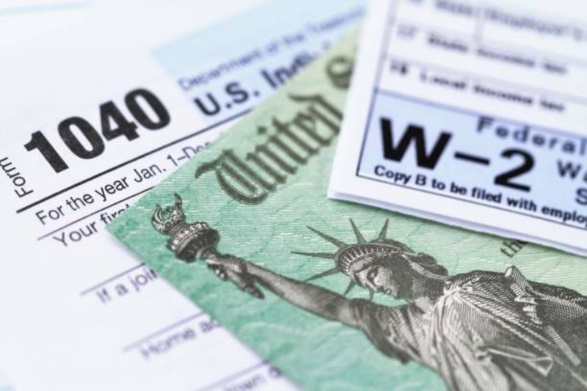A Comprehensive List of States with No Sales Taxes
Jan 13, 2024 By Susan Kelly
Sales tax is one of the biggest pain points for many shoppers, so if you're looking to save some money on your next purchase, it could be worthwhile to research whether there are any states without sales taxes. Luckily, there are a handful of states that offer no sales tax at all—meaning those who take advantage of doing their shopping in these areas can expect to keep more hard-earned cash in their pockets! In this blog post, we'll provide an overview of these special locations and explain why they have opted against implementing a state or local sales tax. From cities with zero retail taxation rates to two states where citizens avoid having to pay certain kinds of taxes altogether; join us as we explore the nation's best options when it comes avoiding paying high levels of sales taxes.
How many states with no sales tax?
Currently, there are five states that do not have a general sales tax: Alaska, Delaware, Montana, New Hampshire, and Oregon. However, each of these states has different rules when it comes to taxes on specific items or services; for example, certain types of goods may be subject to taxes in some areas but not others.
What are the 5 states with no sales tax?

- Alaska: Alaska is one of the most tax-friendly states in the U.S., and it has no general sales tax. However, local municipalities may have their own taxes on certain items.
- Delaware: Delaware does not have a general sales tax, but there are some taxes that apply to specific transactions such as lodging and car rentals.
- Montana: Montana does not have any kind of statewide sales tax or even a local option sales tax; however, certain types of services like dry cleaning can be subject to a special service fee.
- New Hampshire: New Hampshire also boasts zero statewide sales taxes; however, cities and towns may impose an additional property tax on residents for certain items like alcohol or cigarettes.
- Oregon: Oregon does not have a statewide sales tax either, but local governments may impose taxes on certain goods such as cigarettes or alcohol.
Why don’t these states have sales taxes?
Each of the five states listed above has chosen to opt out of implementing a general sales tax for various reasons. For example, Alaska believes that its natural resources should help generate revenue instead of relying solely on taxation of goods and services. Delaware is very business-friendly and encourages companies to locate there by offering no corporate income tax or even no personal income taxes in some cases.
Montana prides itself on having low taxes so it can keep more money in its citizens' pockets. New Hampshire's state motto is “Live Free or Die” so it's no surprise that they avoid sales taxes. Lastly, Oregon believes in supporting local businesses and encourages shoppers to buy from them by offering no statewide sales tax.
How states with no sales taxes can benefit consumers?
No sales taxes can mean big savings for shoppers since it means that they don't have to worry about extra fees on their purchases. This is especially beneficial for those who shop online, as sales taxes can add up quickly when making larger purchases. Plus, shopping in these states can help support local businesses as well—which is an added bonus!
Pros and cons of living in a state with no sales tax:
Pros:
- No sales taxes mean less money spent on purchases.
- Local businesses are supported rather than large corporations who may not pay taxes in the state.
- More money in pockets of citizens due to no tax burden.
Cons:
- State governments will have less revenue available for programs and services that can benefit citizens.
- Some items or services may still be subject to local taxes, so shoppers should do their research before making a purchase.
Overall, states with no sales tax provide an excellent opportunity for those looking to save some cash on their next purchase. With five different locations offering zero retail taxation rates, there's sure to be something for everyone! However, it's important that shoppers understand the different rules and regulations that may apply when shopping or using services in these areas, so be sure to do your research ahead of time.
How Can I Save Money by Moving to a State With No Sales Tax?

If you're looking for a way to save some money, then moving to one of these five states could be the answer. Not only will you avoid sales taxes on your purchases, but you may also qualify for tax breaks on certain items such as income taxes or property taxes. Additionally, relocating to these states can help support local businesses, so it's a win-win situation!
Conclusion:
Living in a state with no sales taxes can be extremely beneficial for those looking to save money on their purchases. From Alaska to Oregon, there are five different states that offer zero retail taxation rates so shoppers can keep more of their hard-earned cash. Additionally, relocating to one of these areas could bring tax breaks for income and property taxes as well, making it an even better option for those who are looking to maximize their savings. No matter what kind of shopper you are, doing research ahead of time and taking advantage of living in a state with no sales tax could be the perfect way to help make your budget stretch a little bit further!
FAQs:
Q: How can I save money by moving to a state with no sales tax?
A: Moving to one of these five states could be an excellent way to save some money since you'll avoid paying sales taxes on your purchases. Additionally, relocating to one of these areas can also help support local businesses while potentially qualifying you for tax breaks on income and property taxes as well.
Q: Are there any cons associated with living in a state with no sales tax?
A: The only real con associated with living in one of these states is that the state government may have less revenue available for programs and services that can benefit citizens. Additionally, shoppers should do their research before making any purchases as some items or services may still be subject to local taxes.









 smartgridinfo
smartgridinfo